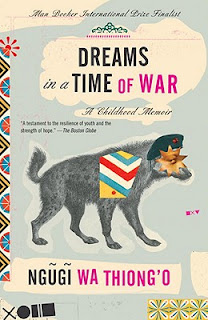A Review by Maya Jaggi, The Guardian
The early novels of Ngugi wa Thiong'o were revolutionary in depicting the terror of the 1950s state of emergency in colonial Kenya through the eyes of Kenyan civilians. A Grain of Wheat (1967) offered a subtler portrayal of Mau Mau than as mere exponents of senseless violence. This absorbing memoir recounts how Ngugi's boyhood was affected by mass expulsions, indiscriminate reprisals and internment camps, during what he has described elsewhere as Britain's "genocidal war". Yet, infused with a child's curiosity and wonder, this book is also deeply touching in its revelation of a whole community's stake in nurturing a writer.
Born in 1938, Ngugi grew up in the shadow of other wars. While soldiers drafted from Kenya and Tanganyika had fought each other for British and German commanders in the first world war ("dying out of proportion to European soldiers"), the peace brought more unfairness: "English soldiers go to war and are rewarded with land taken from Africans." His father had become a tenant to a mission-educated African landlord in a land dispute, later losing his livestock to disease. When he took to drink, Ngugi's mother (the third wife in a polygamous household of 24 children) left him, and he banished her children.
Limuru, where Ngugi grew up, was in an area earmarked after 1902 as "White Highlands". The railway that brought European settlers and Indian workers, while forcing Africans off their land, also provided a literal platform for social activity, as people converged on the Sunday train. Railway carriages, like schools, were segregated, in a British version of apartheid: first-class for Europeans; second-class for Indians; and third-class for Africans. Sex between an African man and a European woman was illegal.
The banning of Mau Mau in 1950, and the eight-year state of emergency, curtailed Ngugi's life as a "troubadour", since even the movement's songs were banned, along with schools founded on African self-reliance. Gone from the syllabus were the African kings Shaka and Cetshwayo. In came Livingstone and Stanley: "We learned that white people had discovered Mount Kenya." Some schools were turned into prison camps. Children were whipped for speaking their mother tongue. Ngugi was freed after being caught in a police dragnet operation, but his half-brother, Gitogo, was shot in the back and killed by a British officer for failing to obey a command to halt. He was deaf. The conflict split the family. Another half-brother, Kabae, earlier drafted to fight in the second world war, worked for the colonial forces. His elder brother, Wallace, was in Mau Mau's supply wing. The book's opening drama is of Wallace evading bullets to join the resistance, adding to its mythic invincibility.
There are the rites of Ngugi's first days at school, his baptism in the Church of Scotland when he chose the name James (which he later renounced) and circumcision. While children jostle for proximity to storytellers on the long walk to school, "zig-zagging along like sheep", Ngugi discovers through the Old Testament in Gikuyu that "written words can also sing". As his abilities mark him out, Wallace dissuades him from carpentry: "He liked it best when I was holding a book." During Jomo Kenyatta's trial Ngugi learns a new word, "propaganda", and that "every event has more than one side to it . . . Trying to make sense of what's around me, independently, and then defending its veracity as well as I can . . . makes me feel that much more a man, my own man."
Before exams that could unlock the door to an elite school, Wallace risks descending from the forests to wish him good luck, saying: "Knowledge is our light", and even Kabae tells him: "The pen is your weapon." As Ngugi notes, "The guerrilla and the king's soldier had both come to say almost identical words to me." Lacking a pass to travel, the teenager has to be smuggled on to a train by the assistant station master – a future mayor of Nairobi.
Ngugi has said that the most beautiful line in Wizard of the Crow, his satire on dictatorship, is: "A translation from Gikuyu by the author." He was imprisoned in Kenya for a year without charge in the 1970s for writing plays in his mother tongue, strengthening his resolve to cease writing fiction in English and champion African languages. So it is ironic that there should be no mention on this book of its being a work of self-translation from the Gikuyu. The whip hand may be stayed, but this suppression seems out of step with his buoyant tale.
